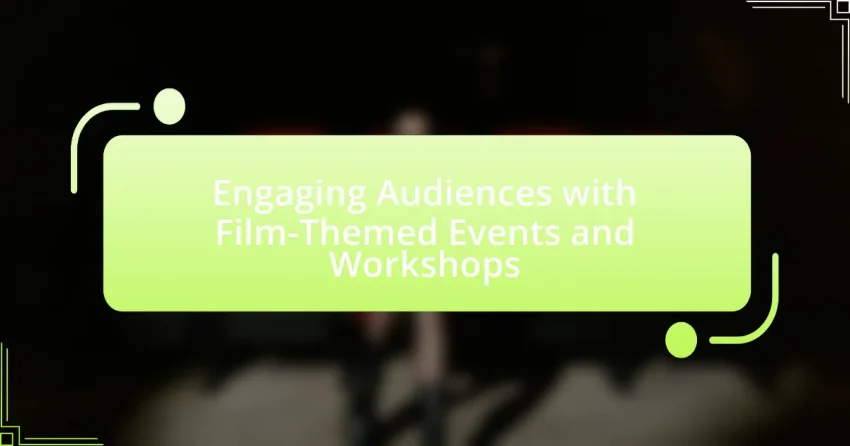Film-themed events and workshops are organized activities that focus on filmmaking, film appreciation, and cinematic storytelling. These events engage audiences through immersive experiences, including screenings, discussions, and hands-on workshops that enhance understanding of film as an art form. Key activities include scriptwriting, directing, and cinematography workshops, as well as interactive elements like Q&A sessions with filmmakers. The article explores the importance of audience engagement strategies, the role of technology, and the challenges of organizing such events, while also providing best practices for enhancing participant experiences and gathering feedback for future improvements.
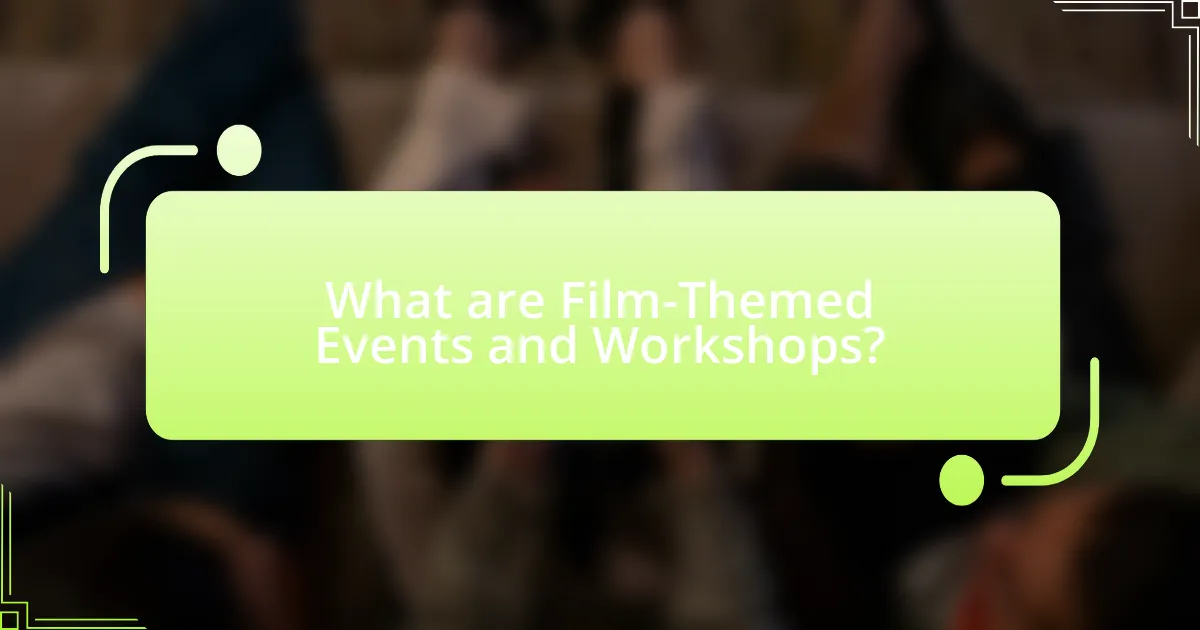
What are Film-Themed Events and Workshops?
Film-themed events and workshops are organized activities that focus on various aspects of filmmaking, film appreciation, and cinematic storytelling. These events often include screenings, discussions, hands-on workshops, and interactive sessions that engage participants in the film-making process or enhance their understanding of film as an art form. For instance, workshops may cover topics such as scriptwriting, directing, cinematography, or editing, providing practical experience and insights into the film industry. Such events aim to foster a deeper connection between audiences and films, promoting cultural exchange and creativity within the community.
How do Film-Themed Events engage audiences?
Film-themed events engage audiences by creating immersive experiences that connect participants with the film’s narrative, characters, and themes. These events often include screenings, interactive activities, and discussions that enhance viewer engagement and foster a sense of community among fans. For example, events like film festivals or themed screenings often feature Q&A sessions with filmmakers or actors, which provide deeper insights into the creative process and encourage audience interaction. Additionally, themed activities such as costume contests or trivia games related to the film can further enhance audience involvement, making the experience memorable and enjoyable.
What types of activities are included in Film-Themed Events?
Film-themed events typically include activities such as film screenings, panel discussions, workshops, themed parties, and interactive experiences. Film screenings allow audiences to watch specific films, often accompanied by discussions that delve into the film’s themes, production, and impact. Workshops provide hands-on experiences related to filmmaking, acting, or screenwriting, enhancing participants’ skills and knowledge. Themed parties create an immersive environment that reflects the film’s setting or genre, encouraging audience engagement. Interactive experiences, such as Q&A sessions with filmmakers or actors, further enrich the event by fostering direct communication between audiences and industry professionals. These activities collectively aim to engage audiences and deepen their appreciation for film.
How do these activities enhance audience interaction?
Film-themed events and workshops enhance audience interaction by providing immersive experiences that encourage participation and engagement. These activities allow attendees to actively engage with the content through hands-on experiences, discussions, and collaborative projects, fostering a sense of community and shared interest. For example, workshops that involve film production techniques enable participants to work together, share ideas, and learn from each other, which increases interaction levels. Additionally, events that include Q&A sessions with filmmakers or actors create opportunities for direct dialogue, further enhancing audience involvement and investment in the subject matter.
Why are Workshops important in Film-Themed Events?
Workshops are important in film-themed events because they provide hands-on learning experiences that enhance audience engagement and understanding of filmmaking processes. By participating in workshops, attendees can acquire practical skills, such as screenwriting, directing, or editing, which fosters a deeper appreciation for the art of film. Research indicates that interactive learning environments, like workshops, significantly increase retention of information and participant satisfaction, making them a valuable component of film-themed events.
What skills can participants learn in Film-Themed Workshops?
Participants in Film-Themed Workshops can learn skills such as screenwriting, cinematography, editing, and directing. These workshops often provide hands-on experience, allowing participants to create their own short films or scenes, which enhances their understanding of narrative structure and visual storytelling. For instance, a study by the University of Southern California found that practical engagement in film production significantly improves participants’ technical skills and creative thinking. Additionally, workshops may cover aspects of film analysis and critique, fostering critical viewing skills that are essential for understanding cinematic techniques and storytelling methods.
How do Workshops foster creativity among attendees?
Workshops foster creativity among attendees by providing a structured environment that encourages collaboration and hands-on learning. This interactive format allows participants to engage in brainstorming sessions, share diverse perspectives, and experiment with new ideas, which are essential components of the creative process. Research indicates that collaborative activities can enhance creative thinking by 20% compared to solitary work, as shown in studies conducted by the University of Michigan. Additionally, workshops often incorporate practical exercises that stimulate innovative thinking, enabling attendees to apply theoretical concepts in real-world scenarios.
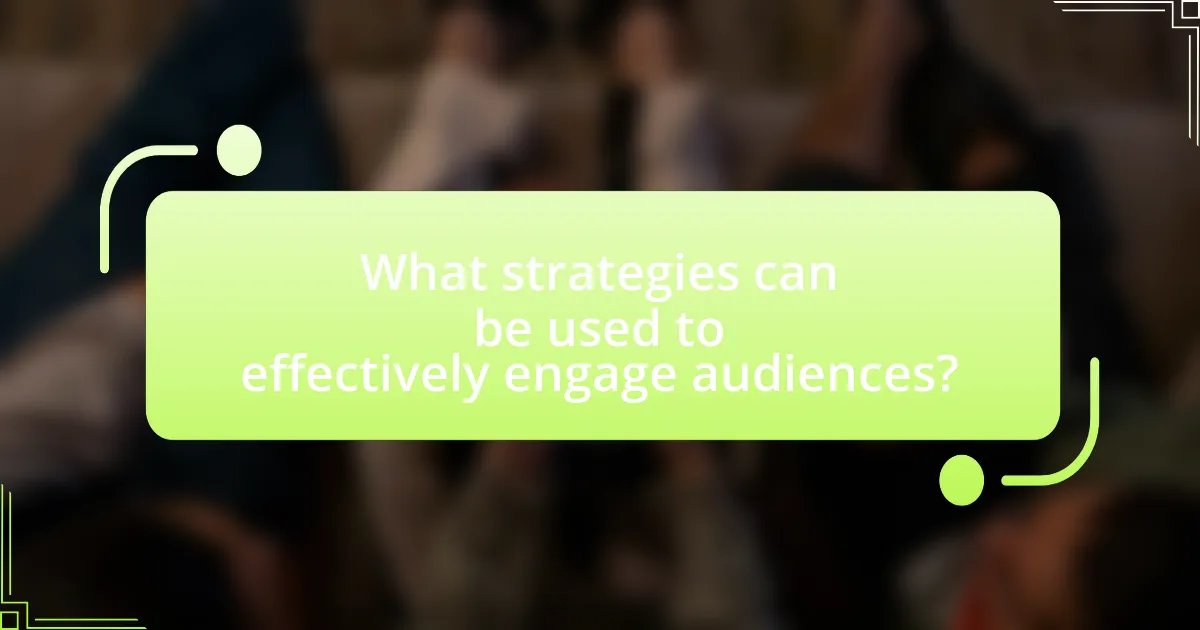
What strategies can be used to effectively engage audiences?
To effectively engage audiences, interactive experiences and personalized content are essential strategies. Interactive experiences, such as live Q&A sessions or hands-on workshops, foster participation and create a sense of community among attendees. For instance, research by the Event Marketing Institute indicates that 74% of participants feel more engaged when they can actively participate in an event. Personalized content, tailored to the interests and preferences of the audience, enhances relevance and connection. A study published in the Journal of Marketing found that personalized marketing messages can increase engagement rates by up to 20%. These strategies, when implemented in film-themed events and workshops, can significantly enhance audience engagement.
How can storytelling be utilized in Film-Themed Events?
Storytelling can be utilized in film-themed events by creating immersive narratives that engage audiences emotionally and intellectually. This approach allows event organizers to craft experiences that resonate with attendees, drawing them into the world of the film through interactive elements such as live performances, themed decorations, and character interactions. For instance, events like film festivals often incorporate storytelling through panel discussions and Q&A sessions with filmmakers, enhancing audience connection to the film’s themes and characters. Research indicates that storytelling in events can increase audience retention and satisfaction, as it fosters a deeper understanding of the film’s context and message.
What elements of storytelling resonate most with audiences?
Emotional connection is the element of storytelling that resonates most with audiences. This connection often arises from relatable characters, compelling conflicts, and universal themes that evoke empathy and understanding. Research indicates that stories that elicit strong emotional responses can enhance audience engagement, as demonstrated by a study published in the journal “Psychological Science,” which found that narratives that provoke emotions lead to better retention and recall of information. Additionally, elements such as suspense, humor, and moral dilemmas further enrich the storytelling experience, making it more impactful and memorable for the audience.
How can storytelling techniques be integrated into Workshops?
Storytelling techniques can be integrated into workshops by using narrative structures to frame the content, engaging participants through relatable characters, and incorporating interactive storytelling elements. For instance, facilitators can begin workshops with a compelling story that illustrates the main theme, capturing attention and setting the context. Additionally, participants can be encouraged to share their own stories related to the workshop topic, fostering a sense of community and personal connection. Research shows that storytelling enhances memory retention and engagement, as evidenced by a study published in the Journal of Educational Psychology, which found that narratives significantly improve recall and understanding of complex information.
What role does technology play in enhancing audience engagement?
Technology significantly enhances audience engagement by providing interactive and immersive experiences. For instance, virtual reality (VR) and augmented reality (AR) allow audiences to participate in film-themed events in a more engaging manner, creating a sense of presence and involvement. According to a study by the University of Southern California, events that incorporate VR elements can increase audience retention and satisfaction by up to 40%. Additionally, social media platforms facilitate real-time interaction and feedback, enabling audiences to connect with content and each other, thereby fostering a community around film-themed events. This integration of technology not only captivates the audience’s attention but also encourages deeper emotional connections with the content presented.
How can virtual reality be incorporated into Film-Themed Events?
Virtual reality can be incorporated into film-themed events by creating immersive experiences that allow attendees to engage with the film’s universe. For instance, event organizers can set up VR stations where participants can explore key scenes or interact with characters from the film, enhancing their emotional connection to the story. Research indicates that immersive technologies like VR can increase audience engagement by up to 70%, as they provide a unique, participatory experience that traditional media cannot offer. Additionally, VR can be used for behind-the-scenes tours, allowing fans to experience the filmmaking process firsthand, which further deepens their appreciation for the film.
What are the benefits of using social media for audience interaction?
Using social media for audience interaction enhances engagement, builds community, and provides real-time feedback. Social media platforms allow organizations to connect directly with their audience, fostering a sense of belonging and loyalty. According to a 2021 survey by Sprout Social, 64% of consumers want brands to connect with them on social media, indicating that effective interaction can lead to increased customer satisfaction and brand advocacy. Additionally, social media enables organizations to gather immediate feedback on events and workshops, allowing for quick adjustments and improvements based on audience preferences. This responsiveness can significantly enhance the overall experience and success of film-themed events and workshops.
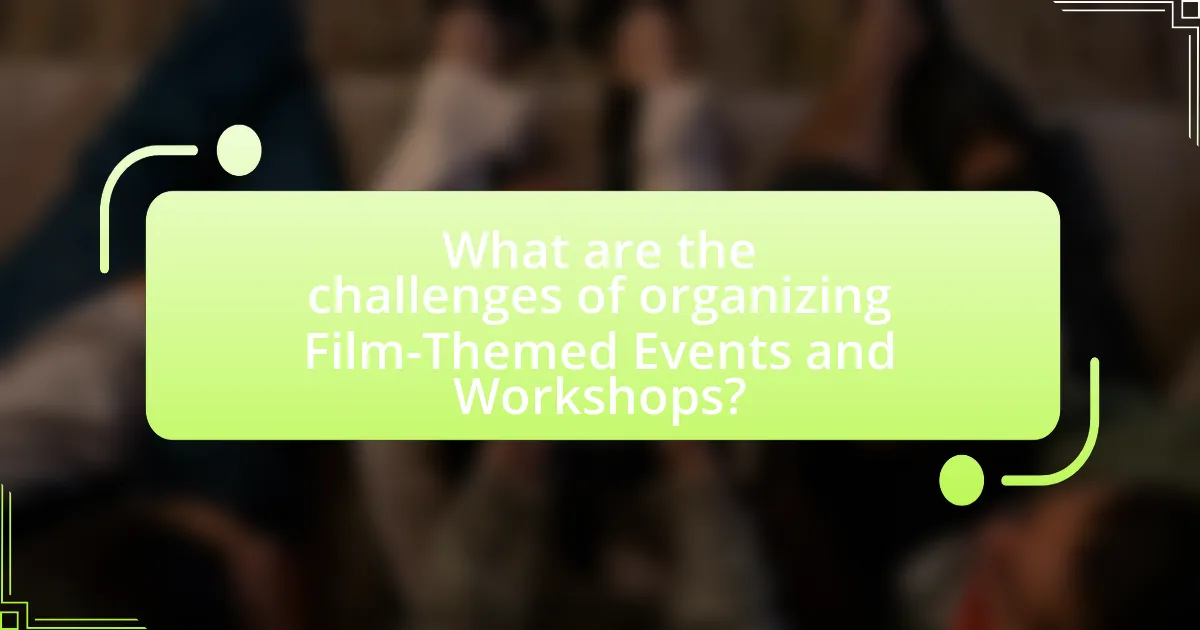
What are the challenges of organizing Film-Themed Events and Workshops?
Organizing film-themed events and workshops presents several challenges, including budget constraints, venue selection, and audience engagement. Budget constraints often limit the quality of production, marketing efforts, and guest speakers, which can affect the overall success of the event. Venue selection is critical, as finding a location that accommodates the desired audience size and technical requirements can be difficult. Additionally, engaging the audience is a challenge, as organizers must create content that resonates with diverse interests and demographics, ensuring that the event is appealing and interactive. These challenges are supported by industry reports indicating that 60% of event organizers cite budget as a primary concern, while 45% struggle with audience engagement strategies.
How can budget constraints impact event planning?
Budget constraints significantly impact event planning by limiting the resources available for various aspects of the event, such as venue selection, catering, and marketing. When financial limitations are present, planners may need to prioritize essential elements, often resulting in a scaled-down version of the original vision. For instance, a study by the Event Marketing Institute found that 70% of event planners cite budget as the primary factor influencing their decisions, leading to compromises on quality or scope. This can affect attendee experience and overall event success, as reduced budgets may limit the ability to engage audiences effectively through high-quality film-themed activities and workshops.
What cost-effective strategies can be implemented?
Cost-effective strategies for engaging audiences with film-themed events and workshops include leveraging partnerships, utilizing social media for promotion, and incorporating volunteer support. Partnerships with local businesses or organizations can reduce costs through shared resources and cross-promotion, as evidenced by successful collaborations that have increased attendance and lowered expenses. Social media platforms provide a low-cost means to reach a wider audience, with studies showing that targeted ads can yield high engagement rates at minimal investment. Additionally, involving volunteers can significantly cut labor costs while fostering community involvement, as demonstrated by numerous events that successfully operated with volunteer staff, enhancing both budget efficiency and audience connection.
How can sponsorships alleviate financial challenges?
Sponsorships can alleviate financial challenges by providing essential funding that supports the costs associated with organizing film-themed events and workshops. This financial backing allows organizers to cover expenses such as venue rental, equipment, marketing, and staffing, which can be significant barriers to hosting successful events. For instance, a study by the Event Marketing Institute found that 84% of event organizers rely on sponsorships to enhance their budgets, demonstrating the critical role sponsorships play in ensuring the viability and success of such initiatives.
What logistical issues should be considered?
Logistical issues that should be considered include venue selection, equipment availability, and scheduling conflicts. Venue selection impacts audience accessibility and capacity, while equipment availability ensures that necessary technology for screenings and presentations is on hand. Scheduling conflicts can arise with other events or within the target audience’s availability, affecting attendance. Each of these factors directly influences the overall success of film-themed events and workshops, as they determine the feasibility and effectiveness of the engagement strategy.
How can venue selection affect audience turnout?
Venue selection significantly affects audience turnout by influencing accessibility, comfort, and overall experience. A well-chosen venue that is easily accessible via public transportation or has ample parking can attract more attendees, as convenience plays a crucial role in decision-making. For instance, events held in popular or central locations often see higher attendance rates; a study by the Event Marketing Institute found that 70% of attendees prioritize location when deciding to participate in an event. Additionally, the venue’s ambiance and facilities, such as seating capacity, acoustics, and amenities, can enhance the audience’s experience, leading to increased turnout. Therefore, strategic venue selection is essential for maximizing audience engagement and participation in film-themed events and workshops.
What are the best practices for scheduling events?
The best practices for scheduling events include identifying the target audience, selecting optimal dates and times, and utilizing effective communication channels. Identifying the target audience ensures that the event aligns with their availability and preferences, which can significantly enhance attendance. Selecting optimal dates and times involves avoiding conflicts with major holidays or local events, as studies show that events scheduled during off-peak times often see higher participation rates. Effective communication channels, such as social media, email newsletters, and community boards, facilitate timely updates and reminders, increasing engagement. These practices are supported by event management research indicating that strategic scheduling can improve attendance and overall event success.
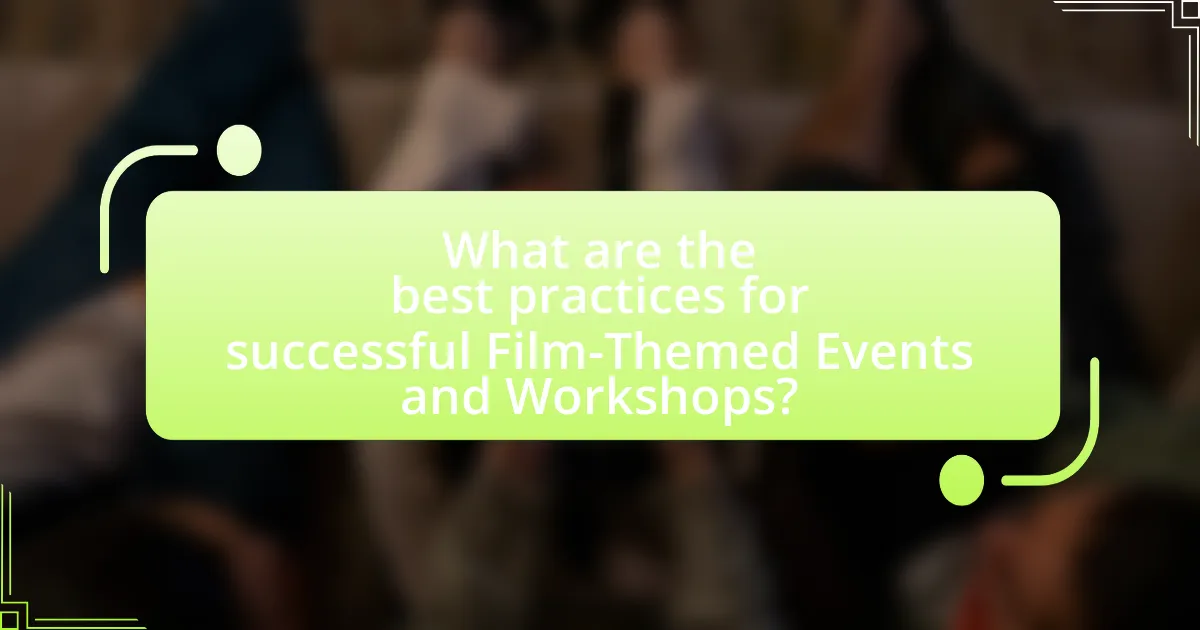
What are the best practices for successful Film-Themed Events and Workshops?
Successful film-themed events and workshops should prioritize audience engagement through interactive programming, relevant content, and effective marketing strategies. Engaging programming includes hands-on activities, Q&A sessions with filmmakers, and screenings that encourage audience participation. Relevant content ensures that the themes resonate with the target audience, enhancing their connection to the material. Effective marketing strategies, such as leveraging social media and partnerships with local organizations, can increase visibility and attendance. Research indicates that events with interactive elements see a 30% higher satisfaction rate among participants, demonstrating the importance of engagement in achieving success.
How can feedback be effectively gathered from participants?
Feedback can be effectively gathered from participants through structured surveys and interactive discussions. Structured surveys, which can include both quantitative and qualitative questions, allow participants to provide specific insights about their experiences. For instance, using Likert scales can quantify satisfaction levels, while open-ended questions can capture detailed feedback. Interactive discussions, such as focus groups or post-event debriefs, encourage participants to share their thoughts in a conversational setting, fostering deeper engagement and richer feedback. Research indicates that combining these methods increases response rates and the quality of feedback received, as participants feel their opinions are valued and considered.
What methods can be used to analyze audience feedback?
Surveys and questionnaires are effective methods to analyze audience feedback. These tools allow organizers to collect quantitative data on audience satisfaction, preferences, and suggestions. For instance, a study by the American Marketing Association found that 70% of event organizers use surveys to gauge attendee experiences, highlighting their importance in understanding audience perceptions. Additionally, social media analysis can provide qualitative insights by monitoring comments, shares, and likes related to the event, revealing audience sentiment and engagement levels. Combining these methods offers a comprehensive view of audience feedback, enabling organizers to make informed improvements for future events.
How can feedback be used to improve future events?
Feedback can be used to improve future events by systematically analyzing participant responses to identify strengths and weaknesses. This analysis allows event organizers to make data-driven decisions that enhance attendee experience, such as adjusting content, logistics, or engagement strategies. For instance, a study by the Event Marketing Institute found that 70% of event planners who utilized feedback reported improved attendee satisfaction in subsequent events. By implementing changes based on specific feedback, such as timing adjustments or content relevance, organizers can create more engaging and successful film-themed events and workshops.
What tips can enhance the overall experience for attendees?
To enhance the overall experience for attendees at film-themed events and workshops, organizers should prioritize interactive elements, such as Q&A sessions with filmmakers or actors, which foster engagement and provide deeper insights into the film. Research indicates that interactive experiences significantly increase attendee satisfaction; for instance, a study by the Event Marketing Institute found that 74% of attendees felt more engaged when participating in interactive activities. Additionally, incorporating themed activities, such as costume contests or film trivia, can create a fun atmosphere that encourages participation and connection among attendees. Providing high-quality refreshments and comfortable seating also contributes to a positive experience, as comfort directly impacts attendee enjoyment and retention.
How can facilitators create a welcoming environment?
Facilitators can create a welcoming environment by establishing clear communication and fostering inclusivity among participants. This involves actively encouraging participation, using inclusive language, and being attentive to the diverse needs of attendees. Research indicates that environments where participants feel valued and heard lead to increased engagement and satisfaction, as highlighted in studies on group dynamics and learning environments. By implementing these strategies, facilitators can enhance the overall experience and effectiveness of film-themed events and workshops.
What are some engaging icebreaker activities for participants?
Engaging icebreaker activities for participants include “Two Truths and a Lie,” where each person shares two true statements and one false statement, prompting discussion and laughter. Another effective activity is “Human Bingo,” which involves participants finding others who match specific traits or experiences on a bingo card, fostering interaction. Additionally, “Speed Networking” allows participants to have brief conversations with multiple people, enhancing connections quickly. These activities are proven to break down barriers and encourage communication, making them ideal for film-themed events and workshops where collaboration is key.
